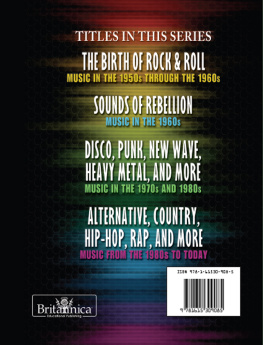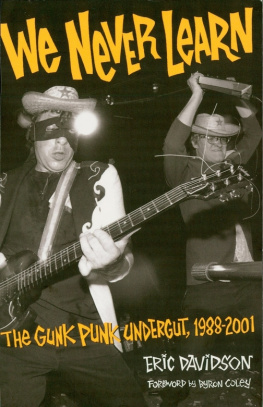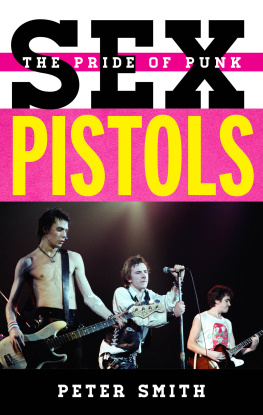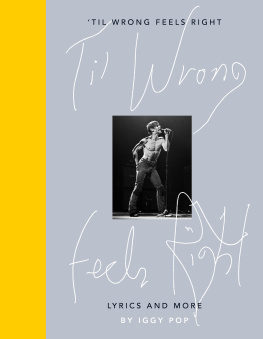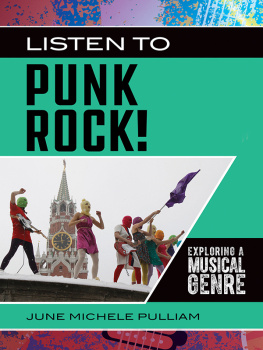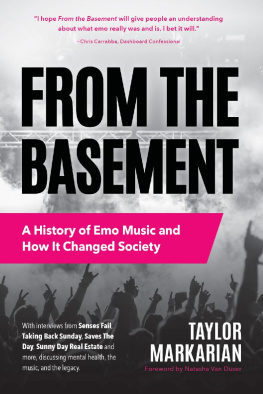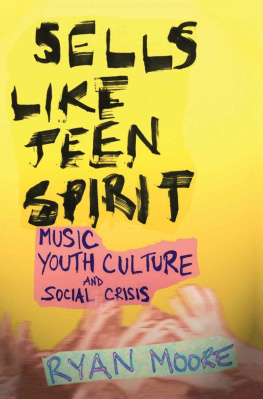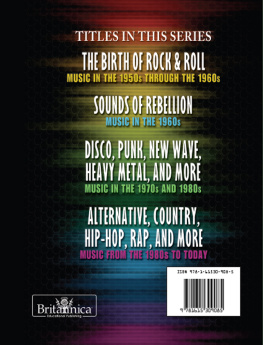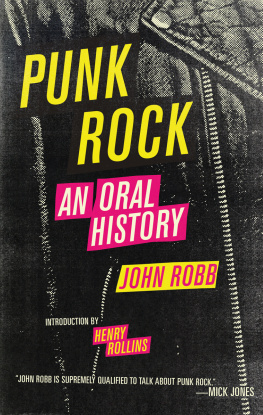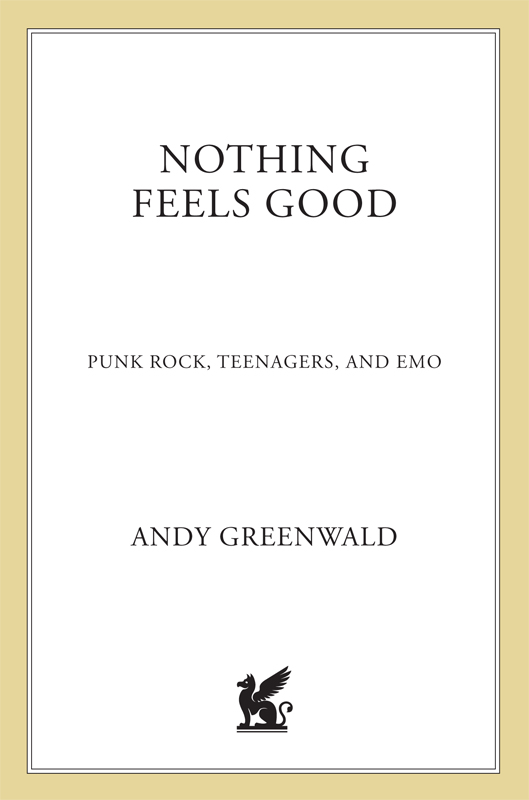
The author and publisher have provided this e-book to you for your personal use only. You may not make this e-book publicly available in any way. Copyright infringement is against the law. If you believe the copy of this e-book you are reading infringes on the authors copyright, please notify the publisher at: us.macmillanusa.com/piracy.
Contents
For my parents, Anne and Michael Greenwald, and for Rachel Bien. Out of love, respect, gratitude, and necessity.
PREFACE
On a warm fall night in Manhattan, kids are buzzing around CBGB. From across the Bowery, it could be any night, any fall from the last twenty yearsyoung discontents and their older, slightly mellowed forebears jacked up on caffeine/nicotine/alcohol/other waiting to get their collective rocks off at the seediest, oldest, and best punk club in New York City. But theres something different about this night, noticeable from the median and then rapidly more so as one approaches the entrance. These arent the violently pierced, mohawked, leathered, pleathered, and glassy-eyed punks of yesteryearthere isnt a single Ramones jacket or safety pin in sight. Nor are they the dirty-jeaned, big-booted collection of indie-rockers, diehards, and straight-edgers of punks more recent milieu. The kids here are different. Shockingly, bizarrely so. The kids, it appears, are all right.
There are young girls in powder blue, midriff-baring tank tops emblazoned with the word rockstar emerging from idling SUVs, waving goodbye to their parents behind the wheel with a dismissive nod. There are clean-cut high school boys wearing baseball hats and overly long shorts and khakis. Serious-looking fifteen-year-olds smile awkwardly and switch off their cell phones. There is backslapping. There are high-pitched giggles.
Its a young and different crowd, in from the suburbs and out in the big city tonight for a concert. Here to watch their version of punk ascend triumphantly and not notice the differences. To sing along wide-eyed and happy. To feel better at the end of the night instead of bruised.
Its November 2001 and Im attending my very first Dashboard Confessional concert. The city is unseasonably warm and warywhat happened two months before still hangs heavy, but not heavy enough to weigh down the enormous anticipation thats building inside CBs scarred innards. Before the show, I run into a friend who attends NYU. She laughs when she sees me. I never figured you for an emo kid, she says. I didnt either, I answer. Shes just there to keep her friend companyher friend who, at twenty-one is a good three years above the rooms median age. She seems embarrassed to be thereor at the very least to be asked about it.
Are you a big fan? I ask the friend.
I think hes really good, she says.
* * *
Just then, the lights dim and the girls recede into the crowd. Some fellows in white T-shirts to my left climb on the back of chairs and start hooting. I catch a glimpse of a small Asian-American teen in glasses standing just below the stage furiously scribbling in her journal, oblivious to the diminishing light. Nervous applause ripples through the crowd. Its the awkward hum of a classroom when the teacher leaves to get help resetting the fraying film reel. Just before the juvenile boiling point is reached, a surprisingly short and compact dark-haired man walks out onto the stage alone. He musses with his collapsed black pompadour hairdo, swings his acoustic guitar to the front, squints into the expectant crowd, and flashes a rabbity, nervous smile.
OK, Chris Carrabba says, are you guys ready to try one?
The crowd erupts, and, as the first few notes are plucked, what was once a disparate collection of homework-dodgers is transformed into a head-nodding choir. Carrabbas voice is a bit yelpy in spots, chasing the high notes like an affection-starved pet nipping at the heels of its owner. He has two full sleeves of tattoos on his arms, one of which strums out chunky acoustic chords. You look cute in your blue jeans / but youre plastic just like the rest dying to look smooth with your tattoos / but youre searching just like everyone. And the audience sings with him. Every single word, with some lingering behind and some charging forward. Its like an extremely successful bout of responsive reading, except the hypercharged and ecstatic look on the kids faces says theyre not just echoingtheyre emoting. When the song ends, everyone screams, as much for themselves as for the shy-looking fellow on stage. The guys next to me are practically falling all over themselves. One of them, baseball hat perfectly molded to his head, arms thrown around his friends shoulders, screams out, We love you, Chris!
The songs go on and onand the crowds voices never diminish. Halfway through, some of the guys are doing harmonies. Its hard to tell whether its CBs notoriously low stage or Carrabbas small stature, but with each successive number the crowd seems to surge up higher and higherboth in volume and massuntil by the end the two sides are meeting each other full-on from the start of each song. Occasionally, Carrabba builds to a refrain and then merely steps away from the mic, letting the devotees fill in the blank. Someone walks past me towards the back, retreating from the stage, crying. But there is no moshing, no physical injuries. Ive never seen such well-behaved teenagers in a rock club. Song after song with titles like Again I Go Unnoticed and This Ruined Puzzle have the kids around me glassy-eyed with glee and reverence.
After a few more rousing choruses, its over.
As the lightsor what passes for lights in the cramped dankness of CBsrise, taking away the equalizing darkness and any possible chance of a second encore, the kids file out, bouncing into chairs, jazzed up from the music, the scene, the experience, their hearts and other muscles sore from a bout of heavy emoting. The guys to my left continue to paw at each otherhigh-fiving, singing fragments of Dashboard songs, laughing over private jokes. Gritting my teeth; I turn to approach them. Though this night hasnt even flirted with the typical, Im still wary. Usually, approaching kids in punk clubs and telling them that you write for Spin is roughly equivalent to tapping a bunch of starving wolves on the shoulder and casually mentioning that youre a rabbit.
Excuse me, I try. The three boys are in mid-celebration, their arms thrown around each others shoulders like theyre doing the Superbowl Shuffle. They look up at me expectantly. Hi. Im a writer for Spin magazine doing a story about Dash
Wow! says the boy in the middle with the white baseball hat. This is slightly better than the slap I was pessimistically expecting.
You guys seem like big fans.
We are!
Thats great. I was wondering if youd be willing to talk to me about him sometime this week, over the phone or maybe even over email?
The boys give me a look like theyve just won the lottery.
Wed love to! gushes the one with spiky, wet-looking hair.
Yeah, wed be honored, says the broad-faced one, deadly serious for a second.
We love Chris, says the white hat. Wed do anything to help him out.
Thats great, I say, handing them business cards. Please get in touch with me sometime next week, if you can.
We sure will!
They continue on their way, still high-fiving as if theyd just been given one more reason to celebrate. Watching them recede towards the exit, I imagine their broad, T-shirted backs would be equally plausible, if not more so, stumbling around the parking lots of Giants Stadium, desperately in search of nitrous balloons or a cheap, illicit beer before the Dave Matthews concert begins. But these kids werent high. They were polite.


